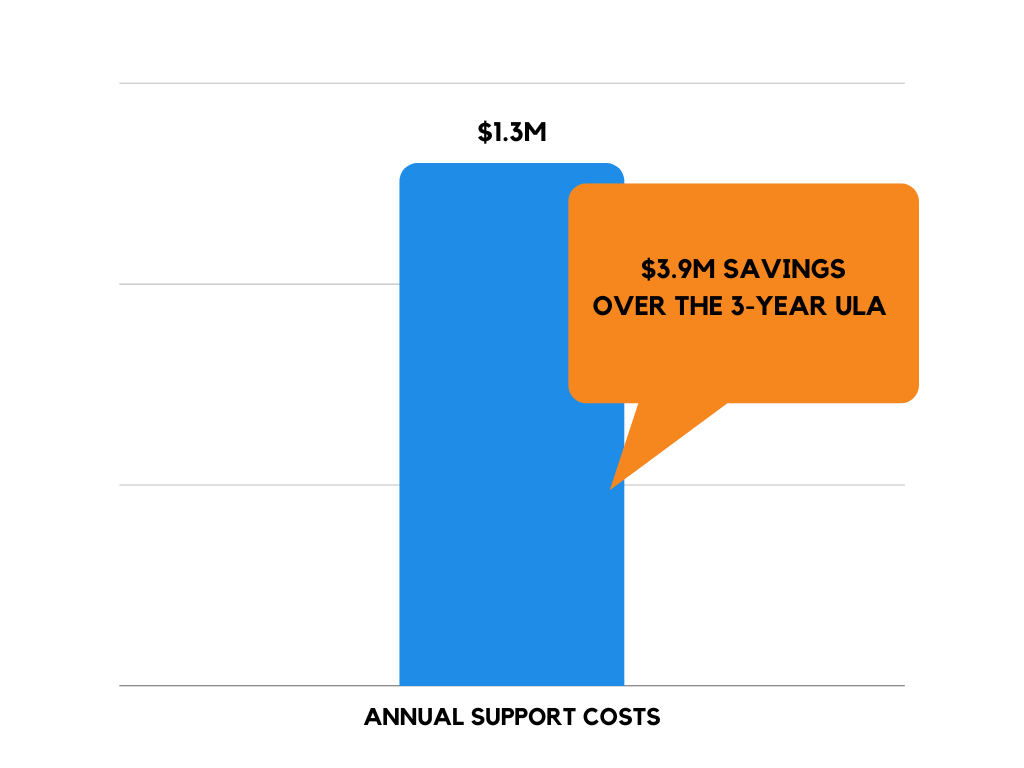Executive Summary
A state health exchange, established under the Affordable Care Act, faced a compliance audit from Oracle, which uncovered significant overuse of licensed products. As part of the ‘Oracle audit playbook’, Oracle billed the state health exchange over $14 million, a sum that would have bankrupted the organization. To resolve the issue, Oracle offered a $5 million Unlimited License Agreement (ULA) — a common tactic in their audit playbook. The state health exchange turned to LicenseFortress, who conducted a Compliance and Optimization Review, identified and corrected Oracle compliance issues, and reduced the exchange’s support costs from $1.7 million to $400,000 annually, saving $3.9 million over three years.
$40K
Project Cost
$3.9M
3-Year Savings
360%
Annualized ROI
At a Glance
Region
Industry
Market
Publisher
Challenge
Solution
Challenges
Oracle performed a compliance audit and discovered that the state health exchange usage was well beyond the licensing agreement. They billed the health exchange for more than $14 million. An amount that would have bankrupted the exchange. So Oracle agreed to settle if the health exchange signed an Unlimited License Agreement (ULA) for $5 million. This cycle is a common tactic out of the Oracle audit playbook.
To meet the tight deadline, the SI licensed Oracle® components exclusively and established multiple teams to work on different parts of the project. The SI then built a virtualized cluster to support the health exchange but, in doing so, inadvertently violated the Oracle license agreement.
The Oracle Audit Playbook
Oracle contracts are full of complexities, often generating compliance issues from the moment the software is installed. They audit their customers, often citing exuberant Oracle compliance fees. Oracle then offers customers out of compliance a “deal.” This is often to push services or products (i.e. cloud credits) that the customer may not want/need. Consequently, customers often settle or renegotiate their terms with Oracle. Ultimately giving an already unfair contractual advantage even more leverage.
Solution
The state health exchange engaged LicenseFortress to help it find ways to decrease its $1.7M annual support costs. LicenseFortress performed a Compliance and Optimization Review of the exchange’s Oracle licensing. After reviewing the health exchange’s contract, LicenseFortress cataloged and inventoried the Oracle products and workloads used across all environments: production, staging, user acceptance testing (UAT), and disaster recovery.
The analysis uncovered Oracle compliance issues. The exchange had licensed 18 products but was only using ten. In fact, had the state exchange just bought its licensing on a per-product basis, it would have paid significantly less than $5 million and faced lower support costs.
At about the same time that LicenseFortress was evaluating the exchange’s Oracle license use. The SI had just completed a technical upgrade to its infrastructure This resulted in a reduced processor count supporting the SI’s virtual cluster. Previously, the health exchange was sharing eight servers on the SI’s joint infrastructure; but with the upgrade, the SI moved the health exchange to its own servers – two servers with 32 cores. This change provided LicenseFortress the opportunity to reduce the exchange’s Oracle licenses.
Working with the SI, LicenseFortress determined that it could restrict the exchange’s Oracle workloads at the host level. This would reduce the number of licenses needed. Also, It would allow the health exchange to terminate the Oracle ULA and buy new licenses at a discount. Of the ten Oracle products, five were put on one server and five on the other server.
Results
The net result? The exchange’s support costs dropped from $1.7 million to $400,000 annually — a savings of $3.9 million over three years and effectively defended against the Oracle audit playbook.

Take Control of Your Oracle Compliance
Navigating Oracle’s complex licensing agreements can be daunting, especially when facing unexpected audits and exorbitant fees. Don’t let Oracle’s audit playbook dictate your organization’s future. By understanding your licensing landscape and taking proactive steps, you can safeguard your organization from unnecessary costs and compliance pitfalls.
Learn how we can help you optimize your Oracle environment, reduce compliance risks, and protect your bottom line

